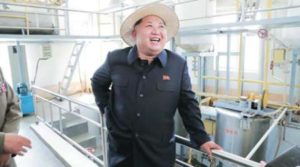by WorldTribune Staff, July 7, 2016
The sanctions the United States slapped on Kim Jong-Un may ruffle the North Korean leader’s feathers a bit, but will have little effect on improving human rights in the communist country, analysts say.
The U.S. on July 6 announced sanctions on Kim and 10 other individuals for “notorious abuses of human rights.” The sanctions affect property and other assets within the U.S. jurisdiction, the U.S. Treasury Department said in a statement.

“Under Kim Jong-Un, North Korea continues to inflict intolerable cruelty and hardship on millions of its own people, including extrajudicial killings, forced labor, and torture,” Acting Undersecretary for Terrorism and Financial Intelligence Adam J. Szubin said.
A long list of previous measures have had no success in pressuring North Korean leaders to change.
“The sanctions from today will do nothing whatsoever to alter North Korea’s strategic calculus and only underscore their thinking that the U.S. has a ‘hostile policy’ against their country,” said Michael Madden, an analyst who studies North Korea’s political system.
“Considering the sanctions name Kim Jong-Un, the reaction from Pyongyang will be epic,” he said. “There will be numerous official and state media denunciations, which will target the U.S. and Seoul, and the wording will be vituperative and blistering.”
Yang Moo-jin of the University of North Korean Studies in Seoul, said “the United States has maintained sanctions and pressure against the North for 65 years since the Korean War, but there’s not been a single case where the intended result was accomplished.
“How much time is left in the Obama administration? There may be the wish to prove the policy of ‘strategic patience’ against the North has not failed, but when it comes to practical results, there won’t be much to show,” Yang said.
Peter Harrell, a former State Department sanctions official, said it was unlikely any assets would be blocked, however “given the realities of where Kim Jong-Un and his cronies likely hide their assets.”
Also designated for sanctions were North Korea’s secret police and their correctional services, which operate the prison camps notorious for human rights abuses, the ruling Workers’ Party’s Organization and Guidance Department (OGD), a key bureau used by Kim to wield control of the party and the government, and lower-level officials, such as Minister of People’s Security Choe Pu-Il.
